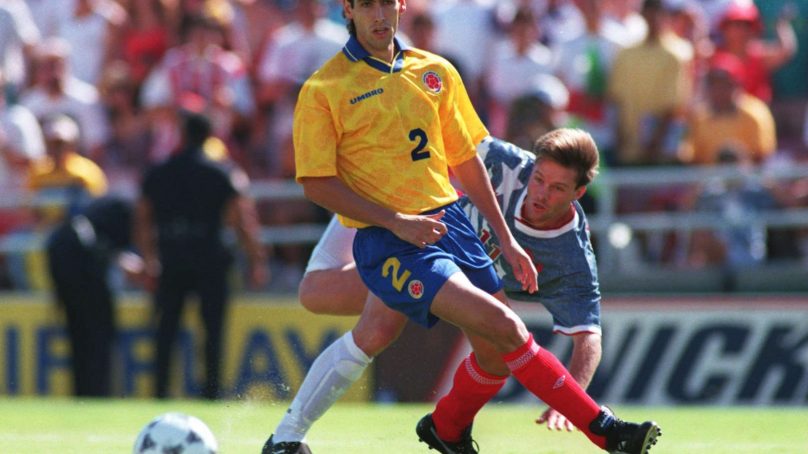
Colombia paid tribute recently to football star Andres Escobar, who was gunned down 20 years ago just days after scoring an own goal at the World Cup finals.
The killing, widely said to be an act of revenge for the 27-year-old defender’s own goal, set off international controversy and put a spotlight on Colombia’s notorious gun culture. The act still resonates and was particularly live when Colombia played against Brazil at the Qatar World Cup in December.
The city of Medellin, where he was murdered, honoured Escobar with a football match, cultural events and flowers.
“I still wonder why they killed him,” his brother Santiago Escobar said at one ceremony. Andres Escobar – always in our hearts. We will never forget your kindness, humility and your fight. I miss you my brother,” he wrote.
Colombia were playing the United States in a group match on June 24, 1994 when Escobar tragically diverted a John Harkes cross into his own net. Colombia lost 2-1 and were eliminated from the tournament. After, Escobar said “life doesn’t end here”.
He started negotiating a transfer to Italian giants AC Milan. But 10 days later, on July 2, Escobar was harangued about his own goal inside a Medellin bar. The argument went on in the car park outside. He was killed with 12 bullets. Witnesses heard the word “gol” shouted after each shot.
A rap band, 12 Pasos Flow, wrote a song in his honour, dubbing him the Gentleman of Football who “died for a mistake.” “He had a date with death the moment he scored that goal,” Gonzalo Medina, author of the book on the murder, said.
Some accounts have blamed drug lords or gangsters, angry at losing money betting on Colombia. But no firm motive for the killing has ever been given. His family is angry that the investigation has never gotten to the bottom of the crime.
Only one person was arrested, Humberto Munoz, the driver of two bar customers who had mocked Escobar for the own-goal. Munoz was released after serving 11 years in prison.
“Justice was never served,” his brother Santiago said. “It was a sad time for our country.” A ceremony honouring Escobar was also held in Rio de Janeiro, one of the World Cup host cities.
“Today, we are celebrating Andres’ legacy,” said Juergen Griesbeck, a German former academic moved by the shooting of Escobar to create Streetfootballworld, a non-profit urban culture movement now present in some 60 countries.
Griesbeck said he set up Streetfootballworld in 2002 as his response to urban violence, using the Escobar case as a touchstone. “We started out as a response to the thousands of violent deaths of young people which occur every year” in Colombia.
Some Colombian fans at this year’s World Cup in Brazil have carried pictures of Escobar to games. Alejandro Arenas, coordinator of Colombian NGO Football and Peace, said:
“Escobar’s death caused so much pain. But despite the violence in Colombia people kept playing football as a way to transcend it. Escobar inspired us to use football as a tool constructing social identity, reflecting the country.”
Andrés Escobar believed in the power of football but paid the ultimate price for his involvement in the game when he was brutally murdered by gangsters following his appearance at the 94 World Cup.
This tragic piece of sporting history and the impact it had on the world is still felt to this today all over the world.
He was born on March 13, 1967, in Medellín, Colombia. He began playing football at a young age and showed great promise as a defender. He started his professional career with the local club Atletico Nacional in 1987, where he won several domestic titles, including the Copa Libertadores in 1989.
In 1990, Andrés moved to Europe to play for the Swiss club Young Boys. He spent two seasons with the team before returning to Colombia to play for Atlético Nacional once again. In 1993, he helped the team win the Colombian championship and was named the league’s best defender.
Whether it was external pressure or otherwise, Colombia’s players were affected and looked like a shadow of their qualifying selves in their opening game which resulted in a shock 3-1 loss against Romania on June 18, 1994 at the Pasadena Rose Bowl.
Things only got worse in the second group stage match – a must-win clash against the United States. Forward Faustino Asprilla told the Irish Times that the team was rattled going into the game, barely speaking a word before the game as nerves got the better of them.
It showed on the pitch as well, with Colombia taking a ‘kitchen sink’ style attacking approach to get on top of the US.
- A Tell / AFP report











